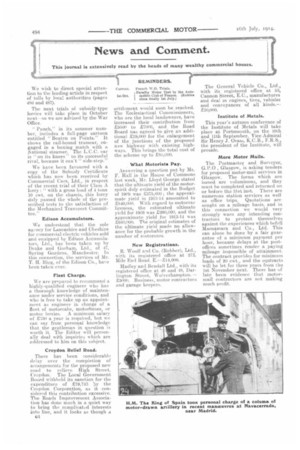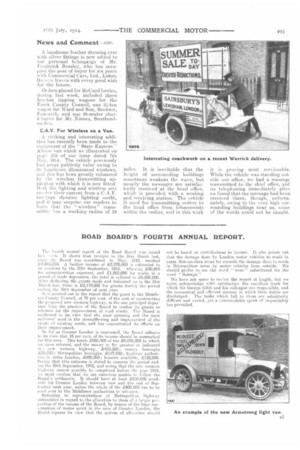News and Comment.
Page 10

Page 11

If you've noticed an error in this article please click here to report it so we can fix it.
This journal is extensively read by the heads of many wealthy commercial houses.
We wish to direct special attention to the leading article in respect of tolls by local authorities (pages 486 and 487).
The next trials of subsidy-type lorries will take place in October next—so we are advised by the War Office " Punch," in its summer number, includes a full-page cartoon entitled "Beaten on Points." It shows the rail-bound tramcar, engaged in a boxing match with a National steamer. The L.C.C. ear is " on its knees " to its successful rival, because it can't " side-step."
We have been favoured with a copy of the Subsidy Certificate which has now been received by Commercial Cars, Ltd., in respect of the recent trial of their Class A lorry : " with a gross load of 4 tons 30 cwt. on the chassis, this lorry duly passed the whole of the prescribed tests to the satisfaction of the Mechanical Transport. Committee."
Edison Accumulator..
We understand that the sole agency for Lancashire and Cheshire for commercial electric vehicles sold and equipped by Edison Accumulators, Ltd., has been taken up by Drake and Gorham, Ltd., of 47, Spring Gardens, Manchester. In this connection, the services of Mr. T. H. Rigg, of the Edison Co., have been taken ever.
Fleet Charge.
We are prepared to recommend a highly-qualified engineer who has a thorough knowledge of maintenance under service conditions, and who is free to take up an appointment as engineer in charge of a fleet of motarca.bs, motorbuses, or motor lorries. A minimum salary of £0 a year is required, but we can say from personal knowledge that the gentleman in question is worth it. The Editor will personally deal with inquiries which are addressed to him on this subject.
Croydon Relief Road.
There has been eonsiderable delay over the completion of arrangements for the proposed new road to relieve High Street, Croydon. The Local Government Board withheld its sanction for the expenditure of £19,743 by the Croydon Corporation, as it considered this contribution excessive. The Roads Improvement Association has done much in a quiet way to bring the complicated interests into line, and it looks as though a c4
settlement would soon be reached. The Ecclesiastical Commissioners, who are the local landowners, have increased their contribution from 25000 to £7000, and the Road Board has agreed to give an additional R193000 for the enlargement of the junctions of the proposed naw highway with existing highways. This brings the total cost of the scheme up to £80,000.
What Motorists Pay.
Answering a question put by Mr. F. Hall in the House of Commons last week, Mr. Lloyd George stated that the ultimate yield of the motorspirit duly estimated in the Budget of 1905 was E375,000 ; the approximate yield in 1913-14 amounted to £840,000. With regard to motorcar licences, the estimated ultimate yield for 1909 was £260,000, and the approximate yield for 1913-14 was £640.000. The original estimates of the ultimate yield made no allowance for the probable growth in the number of motorcars.
New Registrations.
R. Woolf and Co. (Rubber), Ltd., with its registered office at 272, Mile End Road, E.-2.1.4,000.
Hadley and Bendall Ltd., with its registered office at 46 and 48, Darlington Street, Wolverhampton.— £5000. Business, motor contractors and garage keepers. The General Vehicle Co., Ltd., with its registered office at 53, Carmen Street, E.C., manufactures and deal in engines, tires, vehicles and conveyances of all kinds.— £10,000.
Institute of Metals.
This year's autumn conference of the Institute of Metals will take place at Portsmouth, on the 30th and 11th September. Vice-Admiral Sir Henry J. Chain, K.C.B., F.R.S., the president of the Institute, will preside.
More Motor Mails.
The Postmaster and Surveyor, G.P.0 , Glasgow, is asking tenders for proposed motor-mail services in Glasgow. The forms which are issued are voluminous, and they must be completed and returned on or before the 31st inst. There are numerous station services as well as office trips. Quotations are sought on a mileage basis, and in this connection we would very strongly warn any intending contractors to protect themselves against the experiences which befell Macnamara and Co., Ltd. This can alone be done by a fair guarantee of a minimum payment per hour, because delays at the postoffices sometimes render a paying mileage impossible of attainment. The contract provides for minimum loads of 20 cwt., and the contracts will be let for three years from the 1st November next. There has of late been evidence that motormail contractors are not making much profit. A handsome loather dressing case with silver fittings is now added to the personal belongings of Mr. Frederick Beasley, who has occupied the post of buyer for six years with Commercial Cars, Ltd., Luton. He now leaves with every good wish for the future.
Ouders placed for McCurd lorries, during last week, included three five-ton tipping wagons for the Essex County Council, one 3,1,-ton wagon for Ward and Son, Brewers, Foxea.rth, and one 28-seater charit-banes for Mr. Ninnes, Southendon-Sea.
C.A.V. For Wireless on a Van.
A striking and interesting addition has recently been made to the equipment of the " State Express Albion van which we illustrated on page 235 of our issue dated itla niy, 1914. The vehicle previously had great publicity value owing to its handsome illuminated windows, and this has been greatly enhanced by the wireless transmitting apparatus with which it is now fitted. Both the lighting and wireless sets ree..ive their current from a C.A.V. bin• type dynamo lighting outfit, and it may surprise our readers to learn that the " wireless " transmitter has a workinr, radius of 10
miles. It is inevitable that the height of surrounding buildings sometimes weakens the wave, but usually the messages are satisfactorily received at the head office, which is provided with a sending and receiving station. The vehicle ih used for transmitting orders to the head office from tobacconists within the radius, and in this work it is proving most serviceable. While the vehicle was standing out side our office, we had a messagf transmitted to the chief office, and on telephoning immediately after we found that the message had been received there, though, unfortunately, owing to the very high sur• rounding buildings near us, some of the words could not be caught.
























